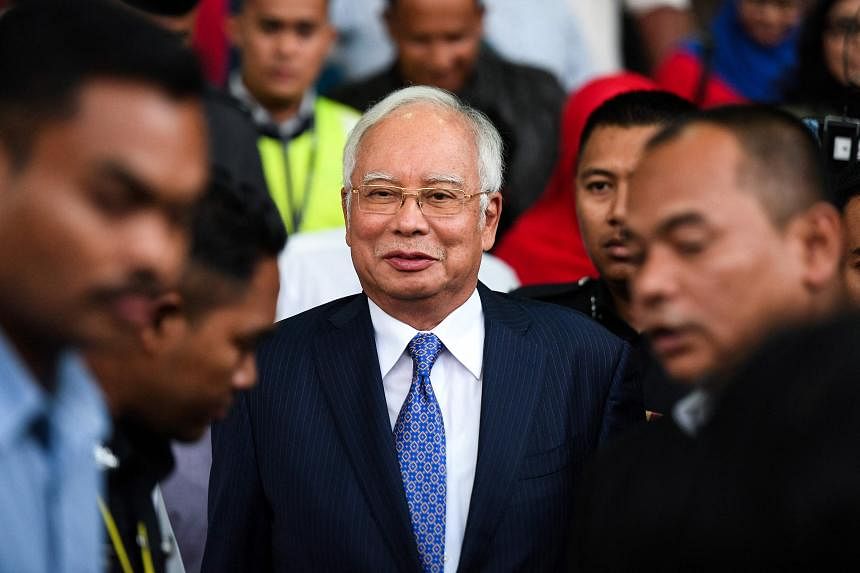KUALA LUMPUR – The fallout from the halving of former Umno chief Najib Razak’s graft sentence related to the 1MDB scandal brings into focus heightening tensions within Prime Minister Anwar Ibrahim’s unity government.
Even before the Pardons Board’s decision was revealed on Feb 2, parties in Datuk Seri Anwar’s Pakatan Harapan (PH) alliance and the Umno-led Barisan Nasional (BN) have already been at loggerheads over a multitude of issues. The Anwar administration also includes a host of parties from East Malaysia that together provide the Premier with a two-thirds supermajority in Parliament.
Some in Mr Anwar’s Parti Keadilan Rakyat (PKR), as well as the leadership of PH partners Democratic Action Party (DAP) and Parti Amanah Negara, demanded explanations as to how 47 graft charges against Umno president Zahid Hamidi, who is also deputy premier, were withdrawn in September.
In January, Umno refused to take up local council positions in Malaysia’s richest state Selangor, controlled by PKR, after its demands for disproportionate representation were rejected. Umno already has an outsized presence in the Anwar Cabinet, compared with the number of MPs it provides to the coalition government.
Just two days before the Pardons Board’s announcement, PKR’s Pasir Gudang MP Hassan Karim also stirred the hornets’ nest by telling Umno it needed to remove Datuk Seri Zahid from the presidency to reverse ebbing support from the Malay Muslim majority.
The deep misgivings of some PH leaders, after former premier Najib’s jail time was slashed to six years from 12, and his fine reduced by a whopping RM160 million (S$45.1 million) to just RM50 million, were unsurprising.
The coalition has made the billions of taxpayers’ money stolen through 1Malaysia Development Berhad under Najib’s watch a key campaign plank for most of the past decade.
That helped end Mr Anwar’s 24-year quest to take power in 2022. But PH now suffers the ignominy of being the ones in charge when former Umno chief Najib won clemency despite still facing multiple trials related to 1MDB.
While PH ended Umno’s six-decade rule in 2018, in large part thanks to public outrage over the scandal, it was the now-deposed Tun Dr Mahathir Mohamad who oversaw a slew of charges being thrown at Najib and other officials for crimes involving 1MDB.
And it was under an Umno prime minister, Datuk Seri Ismail Sabri Yaakob, that Najib was finally jailed after exhausting all court appeals in August 2022.
Not only have the likes of DAP MP Ramkarpal Singh, a former deputy law minister, demanded an explanation from the Pardons Board, the party’s former publicity chief Tony Pua also made a series of scathing statements ridiculing the outcome, going so far as to ask to be sent “to jail for one year and in exchange, pay me RM50 mil (million)?”, a thinly veiled reference to how Najib will have to stay behind bars an additional year if he doesn’t settle the fine.
For his troubles, the former lawmaker is now being probed for sedition for allegedly insulting Malaysia’s king, who chairs the Pardons Board. This is yet another development that will not sit well with PH’s more progressive support base.
First, it is often said how Najib still holds sway within Umno and over a significant number of voters in the crucial Malay vote bank, despite no longer holding office in government or the party. But the same can be said of Mr Pua, who was still being invited to speak at DAP events even after deciding to sit out the 2022 General Election.
Second, this is the latest in a string of crackdowns on freedom of expression that has seen various websites being blocked for being critical of the administration, as well as numerous investigations into and requests for takedowns of social media postings.
Communications Minister Fahmi Fadzil has also warned that action will be taken against those who fail to respect the decision of the king.
This has very much been the party line from PH – that the decision was made by the monarch in his wisdom, and not by the executive government, a template repeated among its cyber troopers.
But this hasn’t seemed to wash with most of PH’s voter base, especially after Umno communications director Lokman Adam thanked PM Anwar and his deputy Zahid on Feb 3 for their efforts in expediting Najib’s petition.
Former Malaysian Anti-Corruption Commission chief Latheefa Koya, who was a PKR leader before heading up the anti-graft body in 2018, also called on the Premier not to “blame the king”.
Mr Anwar acknowledged on Feb 5 that “it is true that as prime minister, I ensured that it (the pardon application) was heard”.
The overriding sense, amid stalled reforms and a leaning towards Malay Muslim nationalism, is that concession after concession is being made to Umno in the 14 months they have been strange bedfellows.
“We need to call a spade a spade. The recommendation by the Pardons Board... is likely a compromise that Prime Minister Anwar Ibrahim and the PH leadership had to make,” said DAP’s former deputy trade and industry minister Ong Kian Ming, calling on the party to take a firm stance that other charges against Najib should not be dropped in a similar fashion like those against Mr Zahid.
“Many DAP supporters have been very patient with many of the political developments which have taken place since the formation of the unity government in November 2022 for the sake of political stability. But their patience is running thin.”
Yet, Umno’s rank and file are clearly not happy campers either. They continue to demand a full pardon for Najib and rely on government patronage. Already, the party’s Sabah chapter is making moves – more than 18 months before polls are due in the eastern state – to oust the government dominated by Gabungan Rakyat Sabah and PH, despite all these parties being partners in the Anwar administration at the federal level.
It is, in fact, Mr Anwar and Mr Zahid – whose personal relationship extends over three decades, back to when the former was a rising star in Umno – who are keeping the unity government together at heavy political cost, while their respective coalition members try – with varying degrees of effort – to conceal their contempt for their counterparts.
The call by PKR MP Hassan for Umno to oust Mr Zahid is therefore tinged with irony. Yes, Umno may do better among Malay voters if it jettisons its incumbent president – widely viewed as an albatross for the party not just due to the perception of graft, but also for going back on a vow not to work with Mr Anwar and DAP. But it may very well do so, as a rival, rather than a partner, to PH.


